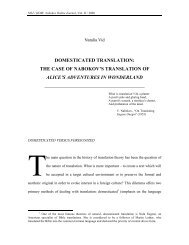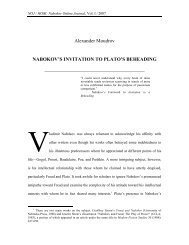You also want an ePaper? Increase the reach of your titles
YUMPU automatically turns print PDFs into web optimized ePapers that Google loves.
I fully concur with Lionel Trilling and contemporary critic James Kincaid that the largely<br />
satirical metaphor Nabokov created is spearheaded with his laughter at<br />
the peculiar sexual hypocrisy of American life… the perpetual publicity we give to<br />
sexuality, the unending invitation made by our popular art and advertising to sexual<br />
awareness, competence and competition. To what end is a girl-child taught from her<br />
earlier years to consider the brightness and fragrance of her hair, and the shape of her<br />
body, and her look of readiness for adventure? (Trilling 2000, 364)<br />
Kincaid, writing in late 2008, echoes Trilling:<br />
John Hollander, in Partisan Review, wrote, "Lolita ... flames with a tremendous<br />
perversity." Possibly, but there's no doubt that the American public does. We have, for<br />
the past 200 or so years, progressively eroticized, put at the very heart of our<br />
constructions of the desirable, the young body, the innocent, the unspoiled. Rather than<br />
facing this head-on, we have manufactured a variety of scapegoats: day-care center<br />
operators, Roman Catholic priests, kiddie-porn rings, Internet predators. Meanwhile, we<br />
go right along, parading before us all the JonBenet Ramseys we can find: Shirley Temple,<br />
Deanna Durbin, Patty McCormick, Brooke Shields, Drew Barrymore, the Olsen twins<br />
(Kincaid 2008).<br />
In other words, the novel can indeed be read as a satirical jab at the “sexual hypocrisy” of the US<br />
society, especially with regard to (pre)pubescent girls, but Trilling suggests that at the same time<br />
Nabokov’s main purpose was to write a “story about love” (Trilling 2000, 364). Humbert’s<br />
“passion-love” (to use Trilling’s key term) for Lolita is, in addition, a Euro-American affair as<br />
the novel’s plot is built around the relationship between a West European intellectual and an<br />
American teenager.<br />
Nabokov was born and raised in Russia during the Silver Age. Much of his career was<br />
spent in and closely linked to the émigré world of Paris and Berlin between the two world wars.<br />
Prior to moving to the US, he wrote almost exclusively in Russian. It is therefore imperative to<br />
summarize possible Russian sources and forerunners of the novel. Establishing this continuity<br />
will enable me to argue that Lolita is in many ways an apogee in the development of post-Silver<br />
Age / modern literary discourses of sex and eroticism. At the same time, these lines of continuity<br />
may also be instrumental in understanding the limits and the pitfalls of Nabokov’s erotic<br />
imagination, i.e., to what extent those could be defined by his “Russianness.” Although the<br />
4

















